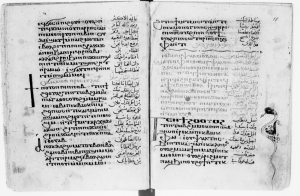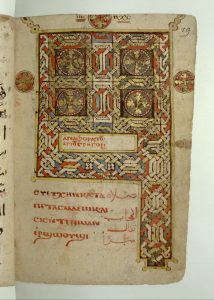Part 2 – What does this have to do with the hymns?
Several concepts were altered along with the phonetics of specific letters. This section is going to be quite long-winded and detailed so please bear with me.
A. In any living language, there are phrases and words that flow together causing the pronunciation of each sound to blend. Using the pseudo-bohairic Coptic, every letter and sound must be audible in order for the word to be read correctly. This adds beats and sometimes measures into the music of the hymns.
B. Jinkim The word jinkim in Coptic actually means movement and they are only used in the event that: (1) a word begins with two consonants (2) if a word needs an extra sound to be pronounceable (3) to denote stress on a specific syllable in a word. If you take a look at any old text you find that very few of them are seen. If a vowel is present at the end of a previous word, or in the second syllable of the same word, the pronunciation of that jinkim drops.
Because the fabricated phonetics ruined the original Coptic sound, jinkim were added in hundreds of places where they were unnecessary in order to complement the pronunciation of the unnatural sounds.
Examples: From the Friday Theotokia (Praise of the Virgin)
This recording is in original Bohairic Coptic (Deacon Antonios Shenouda)
This recording is in pseudo Bohairic Coptic (Deacon Ibrahim Ayad)
You may be able to hear that the first recording is much smoother and that the words flow together much easier, whereas the second rendition shows points of elongation. In this case those elongations occur because extra jinkim were placed on the word ehryi and the pronunciation of the jinkim in `nni,eroubim is unnecessary.
Jinkim are also used incorrectly to indicate the beginning of a Greek loan word.
Examples: The word <rictoc which means Christ
In many recent texts we find it written as ` <rictoc even though the Greek language does not have jinkim. While the Coptic word is just Pi,rictoc, unnecessary jinkim were included so as to point out the location of the loan word. This caused people to pronounce the word as Pi`,rictoc (pi ekhristos) which is in fact incorrect.
Higher Institute of Coptic Studies recording of Pi,rictoc aftwnf (Incorrect)
Deacon Ibrahim Ayad recording (Correct Pronunciation)
Other examples include words such as: Pipneuma vs. Pi`pneuma
C. Double Letters. In the Coptic language double letters like the two “K“ in the word ekklycia were both audible. However, in the Greek language, you only hear one sound for both letters. This is evident in the verse Jwr ebol from the hymn Pouro. It is also evident in the conclusion of the Acts.
Examples: From the Hymn Praxic (Acts of the Apostles)
Cantor Sadek Attalah
Cantor Farag Abdelmessih
From Pouro
Cantor Tawfik Youssef
Deacon Ibrahim Ayad
It is important to note that Cantors Sadek, Farag, and Tawfik all taught in the Higher Institute of Coptic Studies and that they handed down the pronunciation in different ways based on who was teaching at the time.
Other words with the same issue: Pikumillion& Wcanna
These few examples show us that the pronunciation complications that we face now, are in fact a result of the change in the Coptic language that occurred in the 1850s. There are other concepts that were altered as well, but I do not wish to get into them now, because they will not be of assistance in this discussion.


